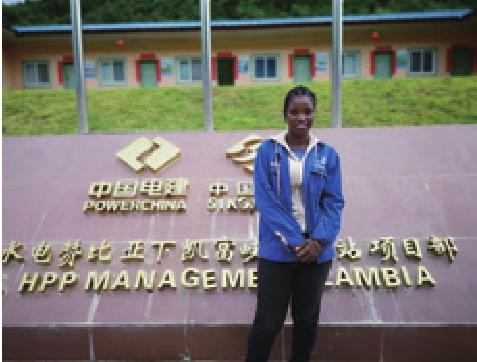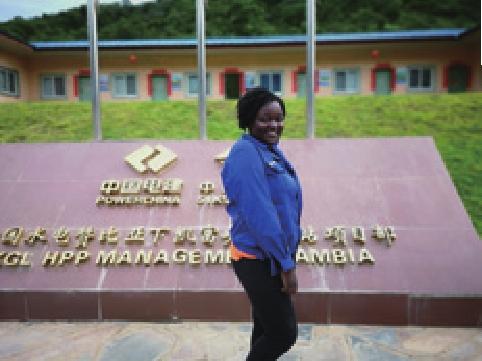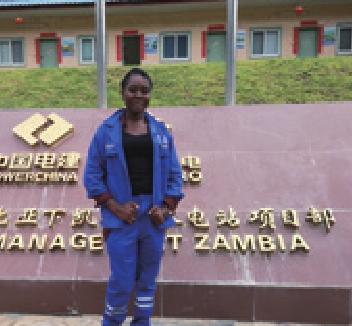Powering Their World
By Li Nan
Four years ago, Dong Latthavongsa was a struggling vegetable grower in Vientiane, capital of Laos, trying to make ends meet after her divorce. Looking for a stable job, she heard that a Chinese company was building a railway line in Kasi, where she lives. It was Sinohydro Bureau 14 Co., whose parent company Power Construction Corp. of China(PowerChina) is a state-owned enterprise and a leading player in the energy industry. Its work also covers design, construction, as well as investment and operation.
Sinohydro is building the China-Laos Railway, a 414-km line that will turn Laos from a landlocked country into a land-linked hub. Latthavongsa, then 29, went to the companys construction site nearby to ask if she could work in their canteen. She was hired to wash dishes and fi nding the job paid well, put in her best effort.
Taking the initiative

Besides her work, she began to plant herbs in the companys courtyard. “After Latthavongsa arrived, our courtyard has been fi lled with pepper, mint and coriander plants,” Liang Zonglei, head of one of Sinohydros construction teams, told Beijing Review.
Her next venture was to ask the head cook if she could make simple Chinese dishes to help her out. Finding her smart and willing to work hard, Li Fenguo, the head cook, said yes and taught her how to cook Chinese food.
Realizing she would have to overcome the language barrier if she wanted to do better, Latthavongsa began to teach herself to speak Chinese. She bought a book to learn Chinese and with the help of Li began to memorize the words in it. Soon the book was fi lled with the notes she had scribbled in Lao. During the meals, she would try out her Chinese on the Chinese engineers and workers and the effort paid off. She began to speak fluent Chinese and help in communication between the Chinese and Laotian workers. Her newly acquired skills saw her wages increase.
In February 2019, the head cook of another canteen of the company retired. Since by that time Latthavongsa was adept at making Chinese dishes and speaking Chinese, she was promoted to that position. She became the fi rst non-Chinese to be hired as head cook at one of Sinohydros five can- teens in Laos. Besides doing her job well, she also acted as a bridge between the Chinese and Laotian employees, which resulted in a pay raise in just five months. Today her income is almost four times what she made before October 2016.

The China-Laos Railway is set to begin operation in December 2021. After the construction team leaves, all the five canteens will be closed. But Latthavongsa has a bigger plan for that contingency: to open a restaurant in Vientiane that will offer both Laotian and Chinese food with an eye on Chinese tourists the new railway is expected to bring in. “I want to make more money and support my son to go to university,” the mother of a 6-year-old told Beijing Review. And she also wants to take the new line to travel to Beijing and see the Great Wall.
Help for a career
On the other side of the world in Zambia, Keithanna Mutempa, a young housewife living in the Township of Kafue Gorge Upper Hydropower Station, Southern Province, wanted to be financially independent. The daughter of a welder, she was interested in welding but had no professional training that would enable her to get a job. But two years ago, a vocational education center established by PowerChina in Chikankata, a district 90 km southwest of capital city Lusaka, began to offer free courses in welding and other technical skills.
PowerChina is building the 750-megawatt Kafue Gorge Lower Hydropower Station Project in Chikankata and spent $1.45 million setting up the Sinohydro Training Institute, which was unveiled by Zambian President Edgar Lungu in 2017. It offers free vocational training courses to provide skilled workers for the hydropower project and generate talents for local projects in Zambia, Fang Zhi, Dean of the institute, told Beijing Review.
After the training, Mutempa found her first stable job as an electric welder at the hydropower project. So far, the institute has enrolled 347 students, including 12 women. Most of them work for the power project after they complete training. In 2019, four got scholarships to study in the Yellow River Conservancy Technical Institute in central China.
Qualified electric welders are rare in Zambia and even more rare are women welders. Working as a welder has transformed Mutempa into a skilled technician.“I am now economically independent,” the 27-year-old told Beijing Review proudly.


